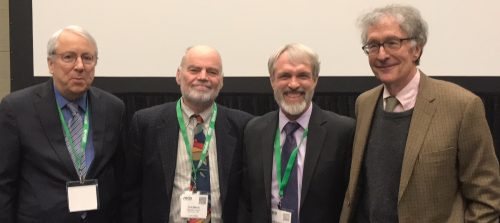Multiple Intelligences Newsletter, Vol 28, No 4
November 1, 2018
Hi to MI Fans,
What are your strongest intelligences??? A few folks contacted me after the last Intelligence Connections issue when I initially raised the question, and shared their strongest intelligences. The lingustic, logical-mathematical, and interpersonal intelligences were mentioned most often. (Perhaps that is logical since most of the readers are educators?!?)

L to R: Armstrong, Hoerr, Shearer, Gardner.
Some folks said that they don’t know because they’ve not had their MI profile assessed. Merits of Branton Shearer’s MIDAS aside – the most widely used MI categorization test – I believe that you can determine your strongest intelligences by noting how you spend your time. (This photo, take at the 2017 Annual ASCD Conference in Boston, shows – from left to right – Thomas Armstrong, me, Branton Shearer, and Howard Gardner. We had just completed presenting a session on MI.)
Sure, some of us spend time at work or at home doing things that are difficult and engaging in tasks at which we don’t excel. When we do so, we’re definitely out of our MI strength zone! I get that (and feel the frustration when I try to balance my checkbook). But what do you do when given a choice? Chances are you choose to spend your free time by engaging in a pursuit that capitalizes on your stronger MI. Does that resonate with you?
So, what do you think are your strongest intelligences? Shoot me an email, I’d love to hear from you.

This issue of Intelligence Connections has two articles that I think will interest you. The first article is a fascinating one, written by Dr. Ellen Winner, a professor of psychology at Boston College whose specialty is gifted children. As you read her blog (which appeared on Howard Gardner’s OASIS website), I suspect you will reflect on some talented students that you’ve taught. And, of course, any discussion of giftedness is embraced by the theory of multiple intelligences. MI means that there are more ways in which someone can be gifted!
The second article looks at the role of IQ in professional achievement. While the study to which it refers is an older and classic one, my bias is that the results are valid today. What do you think?
Thanks for your interest. Feel free to forward this newsletter to someone else who might be interested in these kinds of topics. And I’d love to hear from you!
